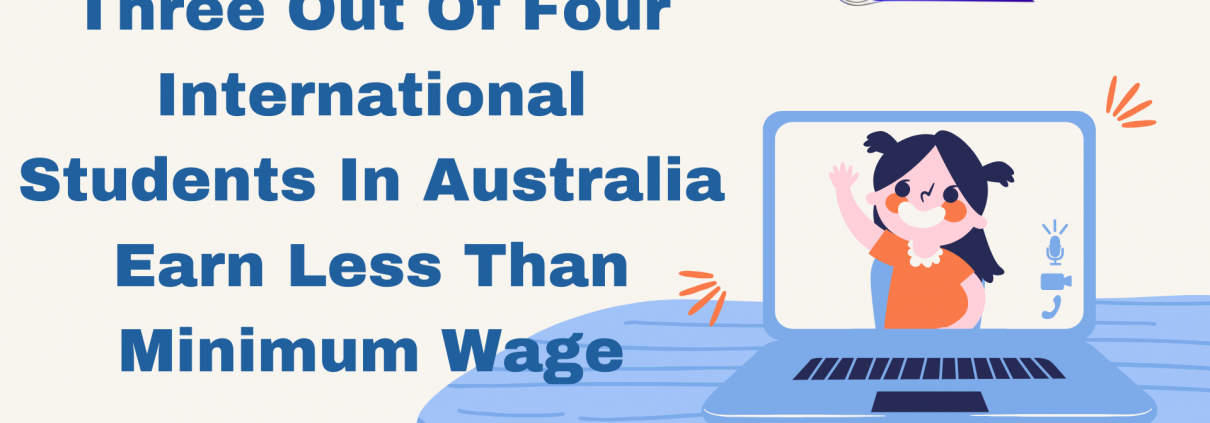The International Students and Wage Theft in Australia report was generated in April and May 2019, and logged responses from over five thousand students. At the workplace, the main findings of the report show that students are facing extreme exploitation. They are in favour that this exploitation should be removed. The report findings also state that 77% of students were given less salary than the minimum casual hourly pay. Around twenty-five per cent of students were found to have received less than fifty per cent of the minimum pay in their lowest-paid job.
Three years back the Australian Fair Work Ombudsman made efforts to enhance remuneration conditions for overseas students. However, the report shows that there are a few areas, where there is no change in the situation since 2016. Bassani Farbenblum, an associate professor from UNSW Law, who co-conducted this report said that the findings displayed that fiddling around the ends of the issue is causing a little effect”.
Pay theft has become a sort of endemic for migrant workers. Several workers in specific industries in Australia are facing such a terrible situation for a couple of years. There is an urgent need to seriously think about the ways to eliminate wage theft in Australia. Quick reforms have to be enforced to student visa conditions, labour enforcement, and a new pay recovery hearing. The chief executive of IEAA, Phil Honeywood, said that the campaign of Fair Work Ombudsman has been seen as effective. It is also noted that there has been stronger enforcement of regulation by the government since 2016.
He told The PIE News that the exploitation of domestic as well as international students at the workplace is objectionable and has to be eliminated. The Fair Work Ombudsman campaign has solicited the active support of the Council for International Students in Australia and a few other student representative councils. A spokesperson from the Department of Education, Skills, and Employment of the government of Australia told The PIE News that substantial measures have already been taken to address the issue of exploitation of migrant workers in recent years.
This comprises of providing new and extra monetary support for the Fair Work Ombudsman and increasing and improving the advice, and tools available to migrant workers that include overseas students as well. Suggestions are made to introduce penalties for the severe cases of underpayment of workers. These suggestions are included as part of the ‘Compliance and Enforcement Working Group’, a part of the Administration’s Industrial Relations Reform salaried group process. The spokesperson said that this group had a fruitful first meeting yesterday.
According to the report, the students are suffering from a few more disturbing issues in the workplace. In addition to being underpaid, they are also suffering from sexual harassment, injuries, and accidents at work. There have been several disturbing proofs that show that the students have to work in an inhuman environment at workplaces in Australia. There are a few students who were made to work for a longer duration and if they complain about the issue then they are fired. Employers were constantly threatening and exploiting these students. Laurie Berg, an associate professor from UTS Law who co-conducted the report with Farbenblum, said that nearly two-thirds of overseas students did not seek assistance for issues that they have been facing at the workplace.
These students have constantly suffered in silence due to concerns related to the visa or fear of losing a job. The report findings also confirmed that several students who opened their mouths to complain against the wrongdoings of the employers were dismissed. She added that their concerns related to the visa are just and there is nothing to prevent the labour regulator from distributing information with migration establishments if the student works for over hours than what is allowed in his/her visa. She also warned that employers know that students won’t complain against them due to the fear of being informed to the Immigration Department aware. They are taking advantage of the immigration weakness of students and exploiting them on that basis. It is required to take strict action against those employers who are involved in this form of practice. Students should be encouraged to talk about their issues so that they can be provided appropriate and timely assistance.
Honeywood told The PIE News that in addition to wage exploitation, the report has also figured out that there are a few more challenges faced by overseas students in Australia. This challenge is related to cultural exploitation. It is seen that various small business employers are hiring students who belong to their language, and cultural background. The employer assures that they will take the role of the de facto “aunty”, or “uncle” of the student. He added the fact is that such conditions mostly involve excessive unlawful hours, low wages, and “off the books” cash jobs. Honeywood also described that students are feeling compromised when they report this issue to the apt authorities. He said that every nation that is a study destination states the same types of concerns about this situation.
Nobody has recognized the level of this crisis. As the survey was conducted, the implementation of social-distancing measures due to the COVID-19 epidemic, several students have to lose their casual jobs. Farbenblum mentioned that when the pandemic restrictions are reduced by the government, foreign students will be more prone to mistreatment and abuse due to the financial crunch situation, and increasing desperation to work in the tightly controlled labour market. This can cause more exploitation among students. No one understands the level of this urgency. So, this week, we will launch a countrywide survey that will take into account all temporary migrants in Australia. The main objective of this survey “the Temporary Migrant COVID-19 Impact survey” would be to assess the overall wellness of temporary international migrants in Australia. This survey is open till July 2020 this year to all those who were in the country on a temporary visa on March 1.
Reference Link – https://thepienews.com/










